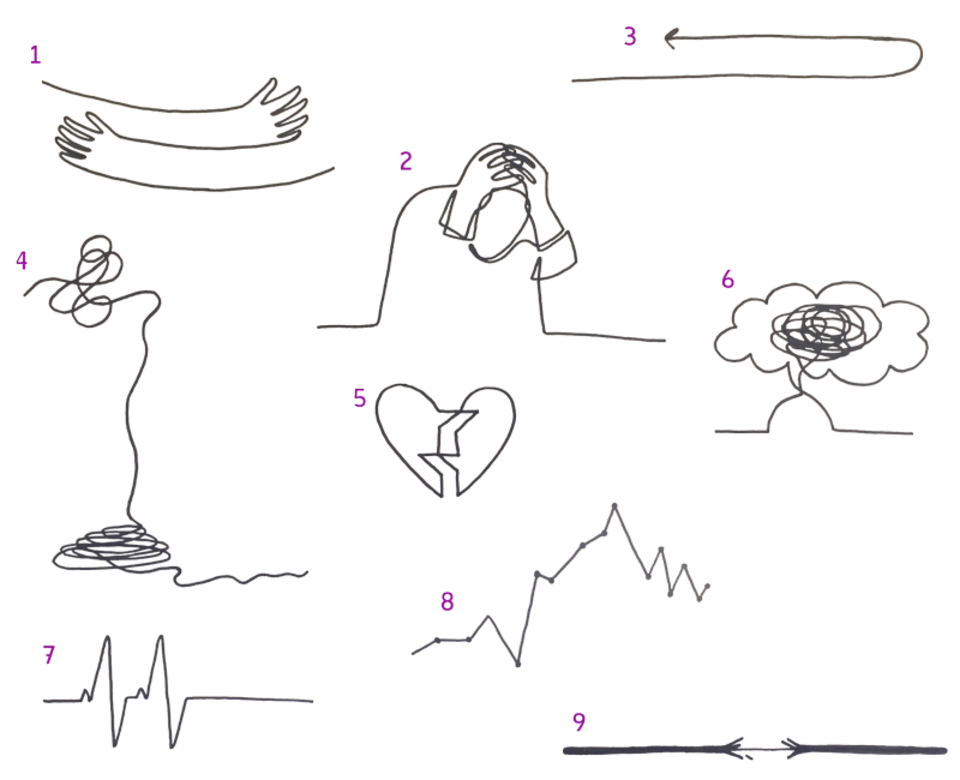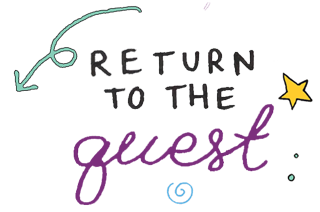
The lines of defeat
This activity is inspired by the Taktikou and Alterlumi dialogues from the philocreation approach of our community partner Brila.
...
| Objective: To propel alternative representations of defeat by putting this concept in our line of sight! |
Duration: 30 to 60 minutes
Material:
- Your imagination
- Sheets of paper and pencils
Instructions:
Imagine defeat. Crossing the finish line! Ah! Isn't that the very symbol of victory? What if, instead of crossing the line of victory, you crossed the line of defeat? Would you cross it with a smile on your face, waving your arms in the air and shouting, "Yes! I lost!"... or would this finish be quieter, looking down with a sullen face? Imagine crossing this line in your head or act it out in a little skit. How is defeat experienced?
Analyze the lines. Now look at each of the lines below. Look at them as a whole, then look at every little detail. Which line could be the line of defeat? Why do you think this line represents defeat?
Interpret the lines. If you had to organize these lines, how would you go about it? Could you rank them from the best to the worst representation of defeat? Hmm... maybe there are different categories of defeat. If so, what would these different categories be? How could they be defined? What are the criteria that would allow you to distinguish these different categories? Are some forms of defeat bad... and others good? In your opinion, should defeat be avoided at all costs? Why or why not?
...
Bonus: There's a fine line between victory and defeat... or is there? At least that's what a lot of athletes say. One small mistake and poof! victory eludes us. But, if you don't win, do you necessarily lose? Is the person who comes second the first of the losers? In your opinion, is there more than a fine line between victory and defeat? What could be drawn between these two concepts? To continue your creative thinking along the same lines, draw what you think lies between defeat and victory. |

| Tricks for tots: If you want to go somewhere, do you think it’s better to go in a straight line or in a zigzag? Which way would be the way to victory... and which way would be the way to defeat? To test this idea, choose somewhere in the room to move to. That will be your finish line! First, make a beeline for it, then come back and zigzag your way there. Hmm... going in a straight line is probably faste, but are zigzags more fun? Do they allow you to explore for longer? Is defeat always sad? Can we learn from defeat? Why or why not? |
| Tips for teens: Did you know that philosophers are interested in sports? There's even a field called the philosophy of sport! While this branch of philosophy has mainly studied the ethical dimensions of sport—for example, sportsmanship, cheating or the foundation of gender categories—philosophers of sport are increasingly interested in sport’s aesthetic dimension. Is aesthetic quality important to an athlete's experience or that of the audience? Is sport an art? In his book Beyond A Boundary, Cyril Lionel Robert James explores the commonality between sport and art. According to the author, both art and sport were created to be beautiful. What do you think? Should we draw a line between these two things or, like the author, go beyond the boundary? Other thinkers say that most athletes prefer an ugly victory to a beautiful defeat. Can victory be ugly... and defeat beautiful? Why or why not? What do you think would be the best option? Illustrate your answer to this question by creating a poem or drawing! |
Share your creative reflections by sending them via email.
Include photos of your projects and notes of your thoughts, as well as your first name and your age!


